What do all Life Sciences organizations, be they startups, established companies, institutions, or research centers have in common? Regulations.
Complying with FDA regulations isn’t optional in the United States. Every step of the way, Life Sciences quality managers are required to comply with agency oversight while also being prepared to produce the right documentation at a moment’s notice to prove that compliance.
Aside from regulatory agency oversight, there are many industry standards that are considered best practices. While there is no requirement for those working medical devices, as an example, to comply with ISO 13485, compliance provides others an assurance that best practices in developing, implementing, and maintaining a Quality Management System (QMS) were used during the development of a device. Adhering to these best practices is also a great way to establish credibility with regulators.
But we’re getting ahead of ourselves. Before you invest in a QMS, you should do a little homework.
It starts with cultivating and maintaining a quality culture, literally from day one. It’s helpful to build some “muscle memory” so that compliance becomes a core part of your company’s DNA and your workflow process. Figure out where you have bottlenecks or points of failure, and address those. This could mean training, it could mean applying enforcement penalties. The goal is to come up with a repeatable process that makes it easier to stay compliant.
If you’re envisioning a stern taskmaster with a clipboard watching over everything, there’s good news. Quality Management Systems (QMS) are designed to help automate a quality culture.
While many types of businesses in highly regulated industries could benefit from a QMS solution, in Life Sciences these requirements should factor into selecting one:
- Does it comply specifically with FDA oversight requirements?
- Does it keep us in an “audit-ready” status at all times?
- Is it cloud-hosted so that remote teams can collaborate from any location?
- Is the solution secure-SaaS to ensure all of our research is safe and secure?
- Can it fulfill all 21 CFR Part 11; Electronic Signatures requirements?
Depending upon your other business systems, you should check to see if and how relevant systems can be integrated. Moreover, if you’re using a suite of office productivity applications like Google Workspace, you’ll likely have the best results with a QMS Platform that integrates with Google Drive.
Lastly, you should ensure that whatever QMS for Life Sciences platform you choose can scale and grow as your company grows.
There’s more to all of this, of course, so click here if you have any questions, or would like to see a demo of AODocs for Life Sciences.



